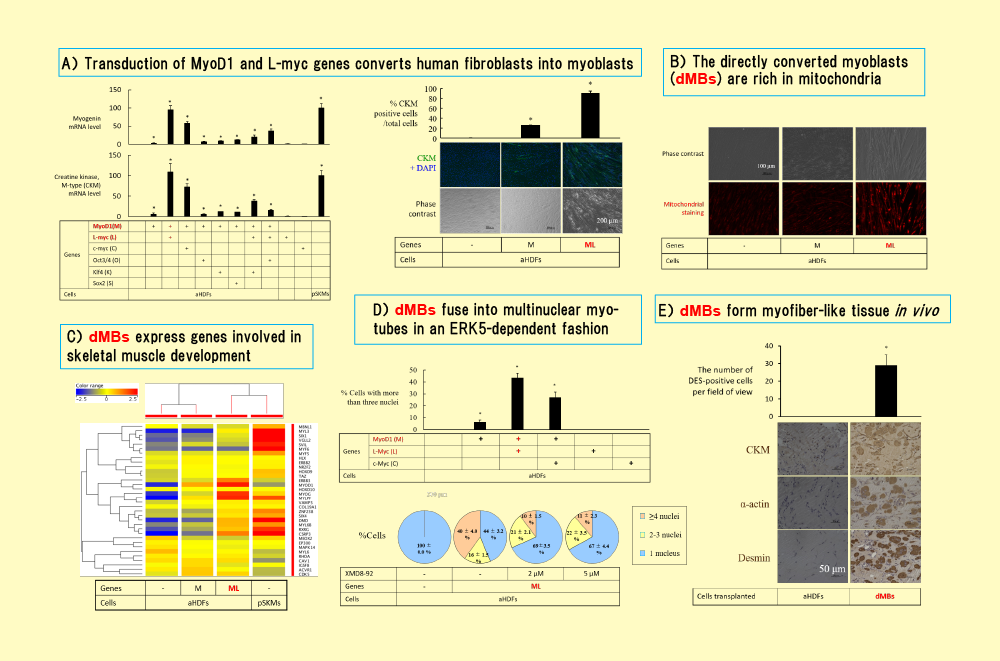プロジェクトのご紹介 6 - Project 6 -
筋芽細胞のダイレクト・リプログラミングと筋管形成
Direct reprogramming of functional myoblasts that are capable of forming multinuclear myotube

The skeletal muscle consists of contractile myofibers and plays essential roles for maintenance of body posture, movement, and metabolic regulation. During the development and regeneration of the skeletal muscle tissue, the myoblasts fuse into multinucleated myotubes that subsequently form myofibers. Transplantation of myoblasts may make possible a novel regenerative therapy against defects or dysfunction of the skeletal muscle. It is reported that rodent fibroblasts are converted into myoblast-like cells and fuse to form syncytium after forced expression of exogenous MyoD1 that is a key transcription factor for myoblast differentiation. But human fibroblasts are less efficiently converted into myoblasts and rarely fused by MyoD1 alone. Here we found that transduction of L-myc gene in combination with MyoD1 gene induced myoblast-like phenotypes in human fibroblasts more strongly than MyoD1 gene alone. The rate of conversion was approximately 90%. The directly converted myoblasts (dMBs) underwent fusion in an ERK5 pathway-dependent manner. The dMBs also formed myofiber-like structure in vivo after an inoculation into mice at the subcutaneous tissue. The present results strongly suggest that the combination of L-myc plus MyoD1 may promote direct conversion of human fibroblasts into functional myoblasts that could potentially be used for regenerative therapy for muscle diseases and congenital muscle defects. (Wakao J. et al, BBRC.).
一部プロジェクトのご紹介 - See some projects among others -
- 新型コロナウイルス・オミクロン変異株に対する茶カテキン類の効果
Effects of tea catechin-related compounds on Omicron subvariants of SARS-CoV-2 - 腫瘍微小環境の低pHはプロトンセンサーGたんぱく共役レセプターをを介して腫瘍のPDL-1の発現を低下させる
Extracellular acidity in tumor tissue upregulates programmed cell death protein 1 expression on tumor cells via proton-sensing G protein-coupled receptors - 緑茶カテキン、カテキン誘導体、およびガレート型テアフラビンによる新型コロナウイルスの試験管内での有意な不活化;紅茶と緑茶による試験管内での唾液中の新型コロナウイルスの迅速な不活化
Significant Inactivation of SARS-CoV-2 by a Green Tea Catechin, a Catechin-derivative and Galloylated Theaflavins in vitro; Rapid Inactivation in vitro of SARS-CoV-2 in Saliva by Black Tea and Green Tea - 新規多孔性3Dスキャフォールドと直接誘導骨芽細胞を用いた骨再生
Nanogel tectonic porous 3D scaffold for direct reprogramming fibroblasts into osteoblasts and bone regeneration - TGFR阻害剤による骨芽細胞のケミカル・ダイレクト・リプログラミング
Chemical direct reprogramming of human fibroblasts into osteoblasts by a TGFR blockade - 筋芽細胞のダイレクト・リプログラミングと筋管形成
Direct reprogramming of functional myoblasts that are capable of forming multinuclear myotube - シュワン細胞のダイレクト・リプログラミングと末梢神経損傷の再生
Direct reprogramming of functional Schwann cells that promote regeneration of peripheral nerve - 褐色脂肪のダイレクト・リプログラミングと代謝疾患の制御
Direct reprogramming of functional brown adipocytes that control metabolic diseases - 骨芽細胞のダイレクト・リプログラミングと骨再生
Direct reprogramming of functional osteoblasts that regenerate bone tissue - IL-21 によるアレルギー応答の制御とその分子機構
IL-21-mediated regulation of allergic responses and its molecular mechanisms - IL-27 による NK 細胞活性化と ADCC を介した腫瘍抑制
IL-27 augments NK cytotoxicity and induces ADCC-based tumor suppression - EBV- エピゾーマルベクターによる外来遺伝子の高効率導入、高発現、長期間持続の機構解明
Mechanisms underlying the high-rate transfection, high-level expression, and long-term maintenance of exogenous genes mediated by the Epstein-Barr virus-based episomal vector - 細胞の分化と初期化に伴う染色体エピジェネティック修飾の解析
Analyses of epigenetic modification of chromosomes upon cell differentiation and reprogramming

